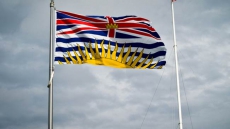An environmental group says Canada needs to up its game on protecting its oceans.
The Canadian Parks and Wilderness Society says in a report that while there has been progress in recent years, recommendations from international scientific bodies suggest there's more work to do.
"At least 30 per cent should be protected if we want to ensure all the habitats are protected and that we're securing the future of healthy oceans," Sabine Jessen, director of the group's ocean program, said Monday.
The report says protecting ocean areas includes banning oil, gas or mineral projects, not dumping waste and ruling out bottom-trawling fisheries.
Jessen credits the federal Liberal government for improvements in recent years.
Two years ago, less than one per cent of Canada's seas were under some form of conservation agreement. That figure has since risen to more than eight per cent.
Jessen suggested Canada is likely to exceed its protection target of 10 per cent by next year, more than meeting its international commitments.
But that goal, part of a multilateral treaty signed by 168 countries, had more to do with politics than science, she said.
"It was based on the fact there was so little protected, but people knew something had to be done," Jessen said.
"It's been a good spur to action, but we know that we're changing the ocean and we really need to protect the places that still have some healthy ecosystems in them."
She points out groups such as the International Union for the Conservation of Nature — one of the largest associations of governments and scientists in the world — suggest greater efforts are needed.
"They had looked at the evidence of what would be needed and they passed a resolution that at least 30 per cent of the ocean should be protected."
The report says Canada is falling behind many of its international peers. Among the 10 countries with the largest marine economic zones, Canada ranks seventh. The United States, Australia and the United Kingdom all rank higher.
Jessen acknowledges some of those countries have large protected areas off overseas territories. As well, degrees of protection vary.
But the rankings do show what is possible, she said.
The report says Canada could get more than halfway toward the 30 per cent goal simply by completing projects already in the works to protect marine areas.
The report notes that saving Canada's seas is also good business. It quotes Statistics Canada figures that indicate more than 100,000 Canadian jobs are directly tied to fisheries and nearly 60,000 to ocean ecotourism.
Climate change makes the job even more urgent, Jessen said. "We're changing the Earth. We need to protect the Earth."

